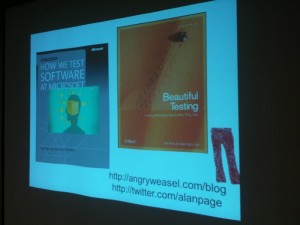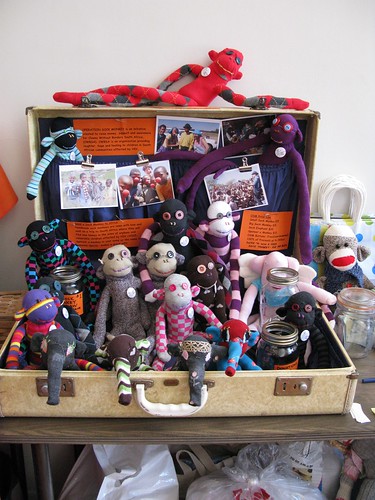
This is a guerilla blog post from PNSQC.
My great friend and fellow testing blogger Trish Khoo recently wrote a post inspired by Goranka Bjedov’s keynote at STANZ 2011. In her post, Trish reacts to some news delivered by Goranka at STANZ: “Quality is Dead.”
This morning I’ve had the pleasure of listening to Julian Harty play understudy for an ailing Goranka with his opening keynote for PNSQC. I am guessing that although Julian gave a talk that seemed very much his own, the heart of what he was saying is similar to what Goranka was exposing at STANZ. (You can bet that as you are reading this, I have absconded to watch the video of her keynote.)
What I noticed not just in Julian’s keynote, but the subsequent presentations I attended today, was not a death so much as a rebirth, a liberation and even a tearing down of walls. At the end of the keynote, I tweeted that I can feel another paradigm shift happening not only testing but also in software.
In the keynote, Julian talked about how Dr. Barry Boehm has moved on from saying that bugs are found more cheaply earlier in the software process. Instead, Boehm has been writing that it is now just as cheap to fix bugs in production. This was the perfect setup for Keith Stobie’s presentation, “Testing Services in Production”. Keith drove home the point that he is currently much more comfortable testing in production than testing in any type of “staging” environment.
Aside from moving testing into a production environment, there is some testing that Keith doesn’t even call testing anymore. He calls it “monitoring.” This is where the wall between testing and production really crumbles away. He talked about moving asserts from tests into the production code. I’m sure that this is nothing especially new. What’s new is that now there are people relying on this code as an indication of system health.
In his presentation, “An Introduction to Customer Focused Test Design“, Alan Page (who got us to lunch on time) talked about how his team has been getting away from even doing functional tests by focusing on “ility” testing instead of functional test design. This in essence, means that his team is much more focused on performance testing.
What does all of this mean for those of us who consider ourselves “QA” or “Testers” or some similar combination. It means that our jobs are changing and will probably look very different in a few years. I lost count of the number of times Julian mentioned “testing not being around,” “automation experts being out of a job,” “testers being out of a job” or even questioning the validity of a testing conference.
As someone who is currently employed to primarily work with test automation and test infrastructure, dId this make me uncomfortable? Not at all. In fact, it’s very exciting. You see, I’m here because I love change and innovation. If there is something better, I’m all for tearing away the cruft and exposing the new. It might mean that I start adding code to the app I work with for web timings or that I end up with a job title that has no trace of “test” or “qa.” The focus is undoubtedly shifting away from looking for bugs and presuming to know what customer’s want to making sure real data is available about system health and that we know how to interpret it.
How does all of this apply to my talk on “Hard Lessons About Soft Skills?” All of this means that we’ll be more embedded with the devs than ever before. In fact, it might even mean that we will be the devs. If they don’t want us on their team anymore because we’ve burned our bridges with them and we are sheltering behind the wall of QA, what’s gonna happen when the wall comes down?
No matter how things shift, I can guarantee that I’ll still be around and giving a shit about how well the software is working and whether or not customers are happy with it. Are you ready to be liberated?
I’ll leave this guerilla testing post with a classic from LEGENDARY rockers, “The Scorpions.”










